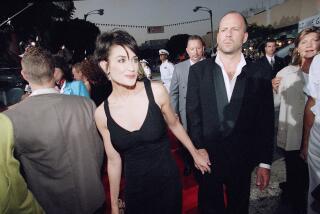MOVIE REVIEWS : ‘Die Hard’ a Slick Flick for Bruce Willis
- Share via
“Die Hard” (citywide) is the archetypal big-deal Hollywood exploitation picture. It’s like a giant war toy, a triumph of well-oiled mechanical precision that performs miracles of destruction. As a grand flourish of cinematic technique, it is awesome; as a human drama, it is disgusting and silly, a mindless depiction of carnage on an epic scale. It is also dead certain to give Bruce Willis his movie stardom at last.
Willis plays New York City police detective/regular guy John McClane, who arrives in Los Angeles on Christmas Eve, hoping to patch up his marriage. An incredibly swift rise to the top of a Los Angeles-based multinational corporation has prompted his wife Holly (Bonnie Bedelia) to move their family west.
But McClane, a dedicated cop with a six-month backlog of cases, has been slow to follow. John and Holly have only a few awkward, tentative moments together during the firm’s Christmas office party in a Century City tower when the building is taken over by 12 men proclaiming themselves to be political terrorists and demanding $640 million in negotiable bonds held in the company vault.
The commandeering of the skyscraper is a textbook study of the process, as terrifyingly persuasive as it is swift. It’s a formidable introduction to the visual virtuosity of director John McTiernan and cinematographer Jan De Bont, who are backed spectacularly well by ingenious production designer Jackson DeGovia and a raft of special effects magicians.
As the terrorist leader (Alan Rickman) and his chief henchman (Alexander Godunov) take the party guests hostage, McClane manages to make his way undetected to the unfinished upper floors of the building. At this point “Die Hard” becomes a war movie, with supercop McClane single-handedly taking on the baddies, thus muscling into Schwarzenegger-Stallone territory.
As it moves from potentially intelligent and compelling thriller into standard issue blood bath--destruction derby fantasy, “Die Hard,” which Jeb Stuart and Steven E. de Souza adapted from Roderick Thorp’s novel, flogs you with ever-escalating, ever-numbing violence, underscored by Michael Kamen’s driving, pounding score.
Various plot holes and an overall increasing strain on credibility aside, “Die Hard” doesn’t miss a trick in a determined attempt to reach the widest audience possible, regardless of the ultimate cost to the film’s quality and worth. (For example, the casting of numerous minority actors in key roles is admirable in itself, but the honor of appearing in this picture has got to be a dubious one.)
The film makers never lose sight of the lowest common denominator at one end of the scale and the yuppie mentality at the other. “Die Hard” plugs into the populist myth that in the crunch both the local police and FBI brass (Paul Gleason and Robert Davi, respectively) will act reflexively like egotistical jerks and that, if the day is to be saved, it will be by canny, resourceful lower-echelon types like McClane.
On the ground, McClane is complemented by veteran LAPD Sgt. Al Powell (Reginald Veljohnson, an actor of warm presence), a self-described “desk jockey on his way home,” the first person to grasp that something is going wrong inside that office tower.
On one level “Die Hard” reveals absolutely no confidence in the audience’s intelligence. It isn’t enough that the relationship which develops between McClane and Powell (via two-way radio) gives the film some desperately needed human dimension, but that warmth is spoiled by the plot-point in Powell’s past on which the final action is hung.
The film makers attempt to deflect the groans such tactics will elicit from more sophisticated moviegoers by treating the whole picture as a joke, a ploy grown familiar from expensive action pix in recent years. This is just great for Willis, whose terrific sense of humor makes him a star as much as his broad shoulders do. But the effect ultimately lays bare the film’s bedrock cynicism. More than anything else, “Die Hard” (MPAA-rated R) tells us a lot about today’s Hollywood.
More to Read
Only good movies
Get the Indie Focus newsletter, Mark Olsen's weekly guide to the world of cinema.
You may occasionally receive promotional content from the Los Angeles Times.










